Over Christmas 2007, having returned to South Africa after living in the States for many years, I sought out a few of the latest books about contemporary South Africa by some of the more acclaimed commentators (RW Johnson, Andrew Feinstein, Max du Preez et al.), so as to get a sense of what had been happening in South African politics while I’d been away. Andrew Feinstein’s book, “After The Party”, particularly outraged me, and it wasn’t long before I started channeling my renewed passion for my country into the songs I was writing.
History shows that South Africa, at the beginning of 2008, was on the edge of a deep dark precipice that no-one, with the possible exception of RW Johnson, saw coming; the age of Zuma was about to begin. 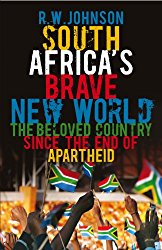
As both a music fan and a songwriter, I had always been partial to protest music. In 2008, I was rediscovering the potent songwriting of Woody Guthrie, Pete Seeger, Nina Simone, Public Enemy, Bob Marley, Bruce Cockburn, Bob Dylan, Phil Ochs, The Last Poets, Steve Earle… singers and songwriters who used the platform of popular music to express and even inspire popular dissent (among other things).
As a songwriter, particularly one who felt at the time that music could somehow ‘change things’ and who was already politicized from a young age during the late Apartheid era, it felt natural to me to take inspiration from that illustrious company and write some songs about the way South Africa was going.
Because it wasn’t going well.
Even at that relatively early stage (only 14 short years after the advent of democracy), things were slowly beginning to sour. The gatekeepers (RW Johnson, Max du Preez, Rian Malan, newcomers like Xolani Dube and Richard Poplak, the faithful at Mail & Guardian and the Daily Maverick as well as numerous others) were already raising alarms, but it was almost as if it was too early; nobody, especially the burgeoning middle class, wanted to know just yet.
So, I thought, let’s sing some protest songs.
In my naivete, I thought I might still have some traction as the singer-songwriter of one of South Africa’s more successful bands. I thought that if I leveraged that and wrote songs about some of the challenges facing our society, people who bought my records might be inspired to pay attention to what was starting to happen to our fledgling democracy.
I was wrong on a number of levels. One of them was the fact of my ‘whiteness’. I liked the audacity of the idea of white protest in post-Apartheid South Africa, because it would be an opportunity to confront racial stereotypes and reinforce the yet-to-be-learned concept of democratic citizenship. I released my first solo album in 2010, and soon after an anonymous ANC-supporter sent me a message asking what right I thought I had to say anything untoward about the government, since I was white and had not participated in The Struggle.
Aha, I thought; this is democracy in action! I sing protest songs because I’m a citizen, not because of my race. South Africa belongs to all of us, I crowed, and the miracle of the Rainbow Nation needs to be preserved fiercely by the whole citizenry, not just black ANC struggle veterans. 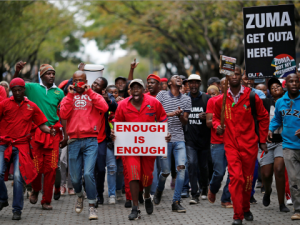
Needless to say, my very puny voice went unheard, and my naïve ideas of the reality of democracy in Africa were found wanting. As for my belief in the power of popular culture to inspire change, well, I found out I was tone-deaf; I failed to see how much of a death music had really died in the post-iTunes climate, and how virtually no-one bothered with pesky protest music anymore. Green Day’s “American Idiot” (2004) was maybe the last hurrah, but even that eventually became a Broadway musical, for goodness’ sake.
All this is to say: in the wake of South Africa’s recent public protests, a friend messaged me suggesting it was time to resurrect my 2010 idea of performing one of my more vociferous protest songs, “A Luta Continua”, on a flatbed truck outside ANC headquarters. Can you imagine, a white rock ‘n roll guy trying to pull that off in 2017? Beside being tarred and feathered, I’d be accused of every flagrant politically-incorrect transgression: “Who do you speak for? Who do you think you are? This is racist! This is opportunistic! This is self-aggrandizing! This is treasonous! This is illegal!”
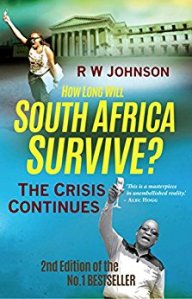 Maybe that ANC stalwart had been right: the valiant efforts of the few brave white rock ‘n roll guys to protest Apartheid in song (Cherry Faced Lurchers, Dog Detachment, Tribe After Tribe) over the years were now absolutely inappropriate in the context of modern South Africa. White protest, as we saw recently in the national anti-Zuma marches, is generally dismissed by the powers that be as ‘racist’, not as legitimate democratic discourse.
Maybe that ANC stalwart had been right: the valiant efforts of the few brave white rock ‘n roll guys to protest Apartheid in song (Cherry Faced Lurchers, Dog Detachment, Tribe After Tribe) over the years were now absolutely inappropriate in the context of modern South Africa. White protest, as we saw recently in the national anti-Zuma marches, is generally dismissed by the powers that be as ‘racist’, not as legitimate democratic discourse.
I still think it’s important for culture to speak truth to power. God knows we have enough songs to party to. Popular music could still use its platform to say something about the times we live in; it just won’t be as ‘pop’ as it was when Dylan released “The Times They Are A-Changin’” or when “Fight The Power” was a radio hit. The reasons for that are the subject of everything Noam Chomsky’s ever written, but suffice to say, popular culture has neutered itself, and we’ll have to go back to placards and burning effigies to unite each other. 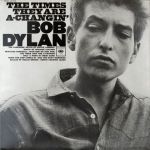
I’m glad I wrote those songs, though; they’ll always have a story to tell. “A Luta Continua” – ‘the Struggle continues’ – I used a clip of Zuma’s insidious cackle on that recording. “Government Song” – the irony of a white male singing “it’s time for another liberation struggle” in post-Apartheid ‘black’ South Africa. “We Are Not A Nation Yet”, “Rights All Wrong”, “Rant” (‘all you champagne revolutionaries’ – that was aimed at the up-and-coming still-thin ANCYL president of the time, Julius Malema). I even wrote two ‘positive’ pro-South Africa songs, “Wonderful Place” and “Come Home“. “Soon There Will Be More Of Us”, my protest-writing swansong. That was in 2012. Well, there’s more of us now, and we’re not just ‘white people’ anymore. 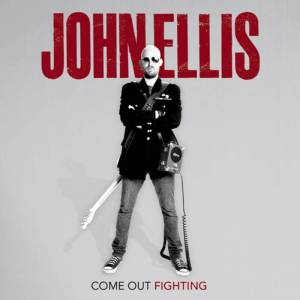
So, I won’t protest outside Luthuli House with an electric guitar. It’d be like juggling outside Parliament; a mild amusement, an embarrassing social media debacle, and ultimately futile.
A Luta Continua.

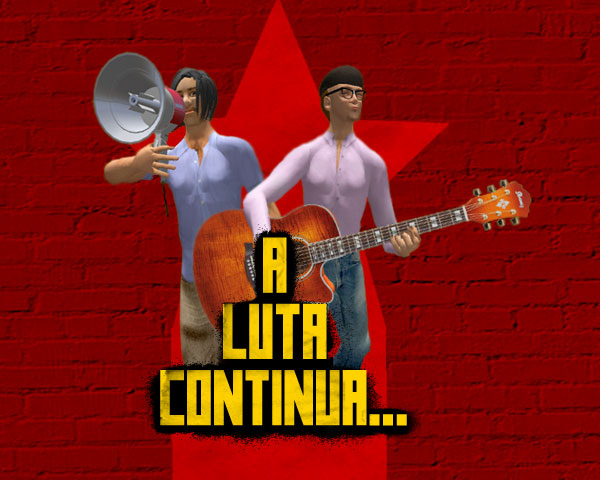
Excellent. I love that album.
LikeLike
I like your site
LikeLike